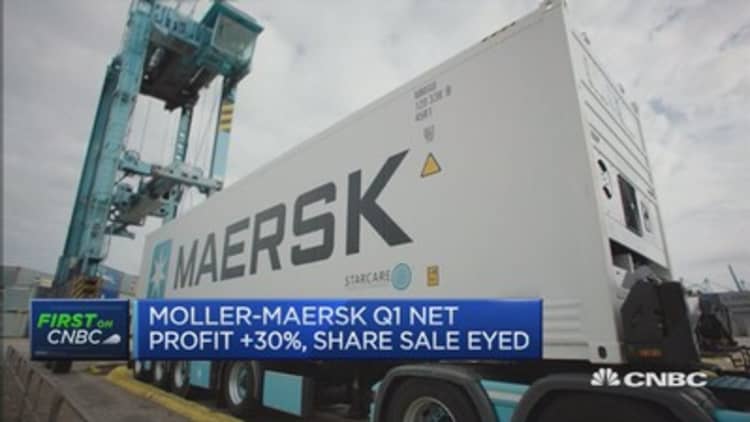
The chief executive of oil and shipping giant Moller-Maersk - which reported earnings that beat forecasts Wednesday - told CNBC that overcapacity continues to dog the shipping industry amid slow-moving economic growth.
"If you look at the profitability of the container industry over the last five years...most companies have been lossmaking," Nils S. Andersen told CNBC Wednesday.
"(But) we see the chance of making money in the industry in being more competitive and giving the customers a better offer than our competition. The last year has given us very good profits, but the situation in the industry I regard as relatively stable, it's just not very attractive."
Maersk, a Danish company, is seen something of a bellwether of global trade as its ships make up 15 percent of world container shipping capacity.
Read MoreRough seas ahead for container shipping industry
Anderson said the company estimated global trade growth of only 1 percent in the first quarter of 2015, on the same period last year, which indicated "a pretty slow-moving economy."
"Of course, the manufacturing output in China is partly affected by domestic demand, but (growth in global trade) is also still to a large extent affected by the situation in the U.S,. and Europe and here the markets haven't been very dynamic."
Moller-Maersk reported first-quarter net earnings above forecasts on Wednesday as the decline in shipping fuel costs more than offset a drop in freight rates. Net profit rose to $1.57 billion in January-March from $1.13 billion a year ago, beating a forecast of $1.13 billion of analysts polled by Reuters.
The figure was helped by income from the sale of a stake in Danske Bank, the country's largest lender, but lower oil prices weighed on the firm's oil production unit. Shares of the company fell 3 percent after the results Wednesday morning.
"There's a direct impact on the oil business itself and then it also impacts the turnover on Maersk Line negatively because we pass part of the saving onto our customers. But overall what we're doing as a result of lower oil prices is reducing costs in Maersk oil and Maersk drilling," Anderson said.
He added that the company still had plans to reduce costs by around 20 percent until the end of 2016. It expects a full-year underlying profit of around $4 billion, a slight upgrade from its earlier guidance for "slightly below" $4 billion.
Revenues fell in the quarter to $10.5 billion from $11.7 billion a year ago, slightly below expectations of $10.9 billion.
The shipping industry has been dogged by overcapacity issues in the last few years as the global economic downturn hit demand for freight.
Lothar Mentel, chief investment officer at Tatton Investment Management, told CNBC Wednesday that the industry still faced significant challenges.
"Particularly with the capacity surplus we've seen over the recent years, I just wonder whether we're working our way through it and we're seeing the end of it," he told CNBC Europe's "Squawk Box.
"It (growth in the shipping industry) was all geared towards that commodity super-cycle never ending, and it has ended."


